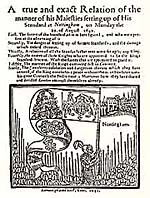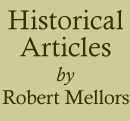The Civil War: 1642-46

Portrait of Charles I by Daniel Mytens (1631).
Charles I. had reigned eleven years without convening a Parliament, but with the Star Chamber and High Commission, fines, penalties, monopolies, customs duties, confiscations, and the like followed. Ship money, which had in time of national danger been enforced in maritime towns for the cost of fitting out ships, was now in the time of peace extended by Laud and Wentworth into a general tax, to be imposed on the whole country. "Newark was in 1636 assessed for ship money at £120, but could raise only £50." John Hampden thrilled the country by refusal to pay the ship money. At the same time Laud was forcing the Prayer Book upon the Scots, who rebelled, and formed the Solemn League and Covenant, and raised money to pay the cost of an army to fight, and the King was compelled to call a Parliament, which not being submissive was dissolved, to be followed shortly by another Parliament, which would not dissolve, for the pent up indignation of its members now burst out uncontrollably. The King’s favourite minister, the Earl of Strafford, was impeached and beheaded. Archbishop Laud was sent to the Tower, where he lay for four years before he was beheaded. "The Grand Remonstrance" was drawn up and published, setting forth the efforts, difficulties, and dangers in the way of the Parliament. It did not seek to abolish Episcopacy, but to reduce the power of the Bishops. It was not revolutionary, but desired the observance of existing laws, and the due administration of justice, the appointment of ministers who possessed the confidence of Parliament, and so forth, and on the King’s demand for the surrender to him of five Members of Parliament preparations for war began.
Nottinghamshire Landowners "Before the flame of the warre broke out in the top of the chimnies," Mrs. Hutchinson says, "the smoake ascended in every country (county)." Both parties had made active preparations, so that "every county had the civill warre, more or lesse, within itselfe. Some counties were in the beginning so wholly for the parliament, that the king’s interest appear’d not in them; some so wholly for the king, that the godly, for these generally were the parliament’s friends, were forc’d to forsake their habitations, and seeke other shelters; of this sort was Nottinghamshire. All the nobillity and gentry, and their dependents, were generally for the King." She speaks of the Earl of Newcastle, (he was the last of this title in the Cavendish family,) as a great prince who had "ran himselfe much in debt." The Earl of Kingston (of the Thoresby Estate) "a man of vaste estate, and not lesse covetousnesse, who devided his sonns betweene both parties, and conceal’d himseife, till at length his fate drew him to declare himselfe absolutely on the kings side." "Lord Chesterfield and all his famely were highly of the royall party; so was Lord Chaworth; the Earle of Clare was very often of both parties, and I think never advantag’d either. All the popish gentry were wholly for the king." Sir John Biron, and all his brothers, "were all passionately the Kings. Sr John Savill, a man of vast estate was the like; so were Sr Gervas Eyre, Sr John Digby, Sr Matthew Palmer, Sr Thomas Williamson, Sr Roger Cowper, Sr W. Hickman, Sr Hugh Cartwright, Sr T. Willoughby, Sr Thomas Smith, Sr Thomas Blackwell, Markham, Perkins, Tevery, Pearce, Palme, Wood, Sanderson, Moore, Mellish, Butler, with divers others."
Parliamentarians. "Of the Parliament men, Mr. Sutton, afterwards Lord Lexington, and Sr Gervas Clifton forsooke the parliament, went to the king, and executed his commission of array. Mr. William Stanhope left the parliament. Mr. William Pierrepont second sonne of the Earl of Kingston was of the parliament. Sr Thomas Hutchinson continued with the parliament. Mr. Henry Ireton having had an education in the strictest way of godlinesse, and being a very grave and solid person, a man of good learning, greate understanding, and other abillities, to which was ioyn’d a willing and zealous heart to the cause and his country, he was the chiefe promoter of the parliaments interest in the country (county)." Referring to the Town of Nottingham, Mrs. Hutchinson says there were "more malignants (? Royalists) than well affected." Of seven Aldermen only one owned the parliament. "All the devout people of the towne were very vigorous and ready to offer their lives and famelies, hut their was not halfe the halfe of the towne that consisted of these; the ordinary, civill sort of people coldly adher’d to the better, but all the debosht, and such as had liv’d upon the bishops persecuting courts, and bene the lacqueys of proiectors and monopolizers and the like, where all bitterly malignant ; yet God awed them.’’
Useful Reformers It should be stated that William Pierrepont, Esq., second son of the Earl of Kingston, had secured the passing of an Act requiring annual parliaments, crippling the power of the King with regard to dissolving parliament in less than fifty days, and Denzil Holles of Haughton, second son of the Earl of Clare, had taken a prominent part with Pym, Hampden, and others, in restraining the royal prerogative, and extending the liberties of the people, for which he was accused of high treason.
Levies. On March 4th, 1642, parliament made an ordinance for the speedy raising and levying of money for the maintenance of the parliamentary army, by a weekly assessment. By this ordinance the weekly assessment of the county and borough of Nottingham was fixed at £187 10s. 0d., a sum which shows the heavy burdens that had to be borne on both sides. And these terrible burdens had to be borne in addition to raids, exactions, and looting, to which the people were subject, sometimes from their so called friends, and sometimes from their enemies, and sometimes from both in succession..
An Awful Position Let us stand still for a minute, and contemplate, the awfulness of the position in our town and county at this time. Here the people are hopelessly divided into two hostile camps, the one regarding themselves as bound to the King, as being the only way to secure law, order, and religion, as they view it; the others feeling themselves bound to oppose the King, as being the only way to secure civil and religious liberty, of which they are deprived, and these differences cannot be settled by a court of law, or by arbitration; and neither party will wait or hear of concession, and they are going to fight, and seek to kill each other, and by fines and imprisonments, by injury to or abstraction of property they will impoverish and harass one another; and hearts will break, and families be divided, and homes be destroyed, and children starve, and obedience to the laws for securing life, liberty, chastity and property be suspended, and hell be on earth. If angels can weep, this is enough to make them.
A Proclamation. On August 12th, 1642, the King issued a proclamation to all subjects residing on the north side of the Trent, or within twenty miles southward thereof, to assemble at Nottingham on the 22nd of August, "where we intend to erect our Standard Royal, in our just and necessary defence, and whence we resolve to advance forward for the suppression of the said Rebellion, and the protection of our good subjects among them, from the burthen of the slavery and insolence under which they cannot hut groan until they be relieved by us." Those that came armed the King promised to at once take into his pay, and at the mine time he asked for loans of money, which he would repay us soon as God enabled him.

Parliamentarian pamphlet on the Raising of the Standard in 1642: " A true and exact Relation of the manner of his Maiesties settting up of His Standard at Nottingham, on Munday the 22. of August 1642".
Standard Hill On the wall of the General Hospital, on Standard Hill, at Nottingham, there is a tablet which reads: "On a mound about 60 yards to the rear of this tablet Charles I. raised his Standard, August 25th, 1642." He had set it up on a tower in the Castle three days earlier. This banner, Bishop Trollope says, was painted by Robert Large, of Nottingham, at the order of Lord Beaumont, and was attached to a long red staff, and next this was displayed St. George’s Cross, and on the red ground of the remainder the Royal Arms, and the motto: "Give Caesar his due." It was pennon shaped, cloven at the end, and from its great length must have formed a conspicuous object as seen from the Town below. Sir William Penniman expressed the opinion that it would be a good deed to burn down the Town below, because its people had not come forth to serve their King." Sir Edmund Verney, the Knight-Mareshal and Standard-bearer of England, when the Standard was set up, stepped forward and passionately exclaimed that "they who would take that Standard from him must first wrest his soul from his body.’’ Then the drums and trumpets sounded, and the troops shouted : "God save the King!" The King commenced the War in Nottingham, apparently because of its central position, and his belief that the people would rally to his support, but they did not.
On the above date the King sent from Nottingham a message to both Houses of Parliament by the Earls of Southampton and Dorset, and others, the answer to which was that until the King’s Proclamations were withdrawn, and the Standard taken down, they could not consistently with the public trust reposed in them, and the general good of the nation, agree to the terms proposed by His Majesty.
A Warrant. Four days after the King had sent the message of peace to the Parliament he issued an Order "from our Court at Nottingham" to all Commissioners, Sheriffs, Mayors, Justices of the Peace, etc., throughout England and Wales, directing them to apprehend the Earl of Essex, who was leading the Parliamentary forces, and his confederates ; to kill and slay all the forces opposed to them and to disarm all Popish recusants, ill-affected persons, Brownists, Anabaptists, and other sectaries, who had certified their ill disposition to the peace and government of the Kingdom.
The King left Nottingham on September 13th.
Clifton. In the Clifton Book, by the Rev. Rosslyn Bruce, a copy is given of a letter written from Nottingham by King Charles, August 31st, 1642, and addressed "to our trusty and well-beloved Sir Gervase Clifton, Knt.," asking for "all the armes you shall think fit to send us in response to which there was within three days sent a number of saddles, bridles, pistols, muskets, spikes, etc. For this, and other help rendered to the King, Sir Gervase had to pay dearly, for he was afterwards by the Parliamentarians fined £4,000—a very large sum in those days. This he paid by four instalments, during the years 1649 and 1650, "as a fine for his delinquency to the Parliament."
